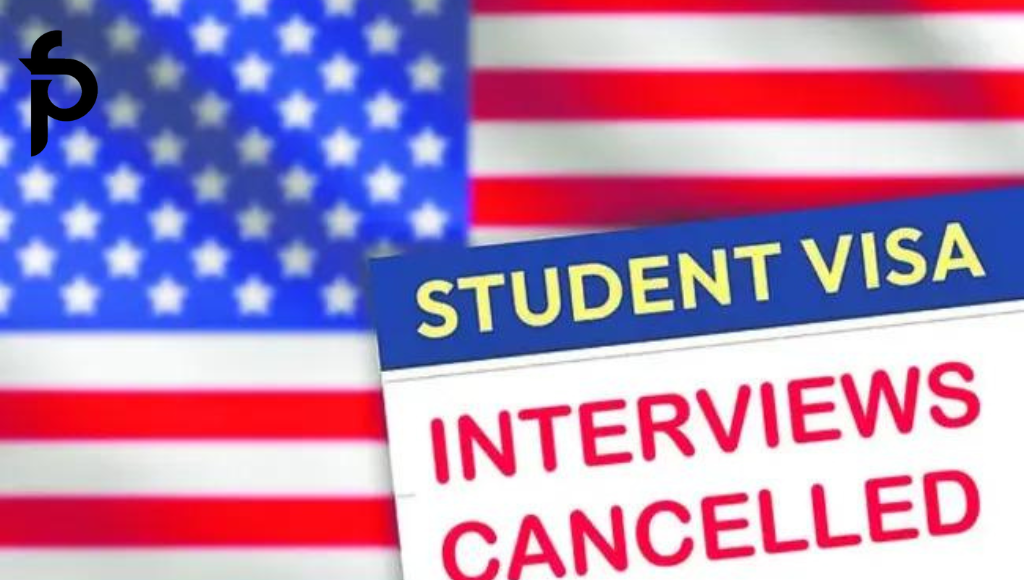Introduction
The United States government has temporarily halted new student U.S. visa appointments at all of its embassies and consulates which has drawn notice from students and universities around the world. It is a step in a plan to apply stricter measures for international students and exchange visitors when they travel to and from the United States.
The move is expected to have a major impact on students applying for visas, universities and immigration counsellors.
Top points to note in the new rules
All un-booked student visa slots are now being removed from the embassies’ calendars, as announced by Secretary of State Marco Rubio in a notice. No bookings can be made at this time until we receive further directions. At the same time, confirmed appointments will remain on the previously scheduled date.
The U.S. government is set to put new background checks in place, focusing especially on social media postings by applicants. We are still learning all the details, but the new measures suggest that authorities will apply tougher scrutiny under the heading of national security.
Who is going to Be Affected?
- It is mostly these three groups that are impacted by the change.
- If you are a first-time F-1, M-1 or J-1 applicant and have not yet gotten an appointment.
- All areas are covered by the directive because it affects every international student and exchange visitor.
- Universities and colleges highly dependent on international students for their increasing revenue.
- Those with an established visa appointment date do not need to do anything — their interviews will be held as originally assigned.
Why the Government Changed Its Policy
- According to the government, the main reason for these changes is to ensure national safety by tracking potential risks more carefully. Lately, there has been more worry about the review process for foreign students, mainly those participating in research or technology studies.
- The move came as relations between the White House and elite universities have become more strained, with President Donald Trump criticizing bodies like Harvard for not being open enough about their admissions processes.
What do Students Should do next?
- Since new appointment scheduling is stopped, here are some important things students should do:
- Don’t forget to go to the U.S. embassy or consulate in your country to get the latest updates.
- Make sure you obtain transcripts, proofs of income and records of anything online, as early as possible.
- Check reliable sources and don’t trust anyone who claims to be an immigration consultant without a license.
- Unless you are told, do not miss appointments, as they are still valid for now.
What People Are Saying
- The first responses from students and education professionals have differed considerably. Some people are pleased with government security efforts, but others worry that deals with the visa process will take longer and be more complex.
- Universities with many international students are concerned that enrolment may fall and this could again hurt their finances, especially as foreign students tend to enrol and pay tuition at prices far higher than domestic students do.
Long-Term Implications
- Widespread use of these new strategies might transform the field of U.S. higher education. Over the long term, effects might include:
- A fall in international student figures because of more challenges.
- We are seeing more students coming to countries such as Canada, the UK or Australia for education.
- Greater administration expectations on universities to deal with changes in admissions and visa policies.
- If the new vetting is seen as too aggressive or discriminatory, experts say that lawsuits might happen.
Conclusion
Suspending new student visa appointments marks a big change in how the U.S. admits international students. While the details of new checks are underway, students should remain aware, exercise care and anticipate a different kind of application procedure.
This decision could shape how the U.S interacts in the worldwide field of education and immigration for a long while.
Resources
US Department of State – Student Visas
You get an appointment from the U.S. Embassy Appointment System.
Read Also :
Here’s How to Get Online Learner Driving License in Sindh
Frequently Asked Questions (FAQs)
1. Why has the U.S. government suspended new student visa appointments?
The suspension is part of new national security measures aimed at increasing background checks and scrutiny, particularly around students in research and technology fields.
2. Who is affected by this policy change?
First-time applicants for F-1, M-1, and J-1 visas without a confirmed appointment are affected. It applies globally to all embassies and consulates.
3. I already have a visa appointment. Will it be cancelled?
No. If you have a confirmed appointment, it will proceed as scheduled unless you receive specific instructions otherwise.
4. Can I still apply for a U.S. student visa right now?
You can prepare your documents, but you cannot book a new visa interview appointment until further notice.
5. What should I do while appointment bookings are on hold?
Stay updated via your local U.S. embassy or consulate, prepare all required documents, and monitor official U.S. government channels for changes.
6. How long will this suspension last?
There is no official end date yet. The policy will remain in effect until the U.S. government announces further guidance.
7. Are current U.S. student visa holders affected by this?
No. Students who already have a valid visa or are currently in the U.S. on a student visa are not affected by the new appointment freeze.
8. Will this impact university admissions?
Possibly. Many universities rely on international students for tuition and may experience enrolment delays or drops due to the visa suspension.
9. Are background checks now part of the student visa process?
Yes. New procedures include deeper background checks, especially examining applicants’ social media history.
10. Where can I get reliable information and updates?
Check the official U.S. Department of State – Student Visas page, your local U.S. embassy website, or your university’s international student office.




